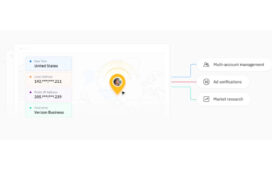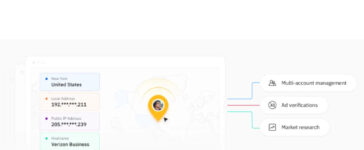In today’s digital-first business world, making smart decisions depends on having accurate data. Still, a lot of businesses use old methods like paper forms or manual spreadsheets, which are prone to mistakes and delays. Mobile data collection apps are changing the game in this area.
Statista says that the global big data and business analytics market will be worth $349 billion by 2030. This shows how businesses are relying more and more on real-time, accurate information. Businesses can make smarter and more confident decisions by using mobile data collection solutions to gather, process, and analyse information more quickly.
We’ll talk about five ways that mobile data collection apps help people make better decisions and why they are important for businesses today.
1. Data is available in real time
The old-fashioned method of data collection often results in time delays due to the need to fill out, move, and then digitise forms. Mobile apps get rid of this delay by letting you send data right away and sync it with the cloud.
How this helps you make decisions:
- Leaders can act right away when things change.
- Dashboards that update in real time give you the most current information.
- Quickly deal with crises like problems with the supply chain or issues on-site.
For example, a field survey team that gets customer feedback can send in their results right away, which lets management change their plans in a matter of hours instead of days.
2. More accurate and fewer human errors.
When you enter data by hand, you are more likely to make mistakes like leaving out fields, writing that is hard to read, or making copies of records. Mobile apps fix this by using validation rules, required fields, and automatic data checks.
Why this is important for making choices:
- Leaders need accurate information to avoid making mistakes that cost a lot of money.
- Standardised data formats make things more consistent between departments.
- Having accurate data makes people more confident in their business plans and forecasts.
Gartner says that businesses lose an average of $12.9 million a year because of inadequate data quality. Mobile apps can help a lot with this problem.
3. Better data visualisation and analysis
The first step is to collect data; the second step is to make sense of it. Most mobile data collection apps have built-in analytics or work with BI tools to turn raw data into useful information.
Benefits include:
- Charts and graphs that are easy to read make it easy to spot trends.
- Predictive analytics lets you make decisions ahead of time.
- Custom reports let teams focus on the most important metrics.
For example, a logistics company can quickly see how well deliveries are going in each area, which helps managers use their resources more effectively.
4. More openness and teamwork
When departments store data in silos, they frequently make decisions based on incomplete information. Mobile apps store data in the cloud, which makes sure that everyone who needs to see it has access to the most up-to-date information.
Effect on making decisions:
- It makes it easier for teams to work together (sales, operations, HR, etc.).
- Makes people more responsible because all actions can be tracked.
- It reduces the need for duplicate work and conflicting reports.
This shared visibility encourages everyone in the organisation to make decisions based on data.
5. The ability to grow and change
The amount and complexity of a business’s data grow as it gets bigger. Mobile data collection tools are made to be able to handle big datasets without losing speed.
Why this helps you make better choices:
- Businesses can expand without fear of data stagnation.
- Forms and workflows that can be changed make it possible to tailor them to different projects or fields.
- People who make decisions can quickly change to meet new market needs.
Scalability makes sure that insights stay accurate even as business needs change, whether it’s for healthcare providers or construction companies.
Last Thoughts
Mobile data collection apps give businesses the power to make smarter, faster, and more confident choices in a time when speed and accuracy are what set them apart from their competitors. These apps turn raw data into useful information by giving users real-time access, cutting down on mistakes, letting them see the data, making it easier to work together, and growing with the business.
If a business wants to do well in a data-driven economy, it needs to switch to mobile-first collection tools. It’s not just an upgrade.
Questions and Answers
Q1. What are mobile data collection apps?
These are digital tools that let businesses use mobile devices to collect, store, and analyse data. They are often linked to cloud platforms.
Q2. What kinds of businesses get the most out of these apps?
The healthcare, logistics, construction, market research, and retail industries are some of the most important ones that use mobile data collection to make things run more smoothly.
Q3. Are these apps safe?
Yes, most apps use encryption, authentication, and secure cloud storage to keep data safe and follow privacy laws.
Q4: How do they save time compared to doing things by hand?
They eliminate manual entry, reduce errors, and allow instant data transfer—cutting down processing time significantly.
Q5. Are mobile data collection apps useful for small businesses?
Of course. Many providers have plans that are affordable and can grow with your business, making them ideal for startups and small businesses.







